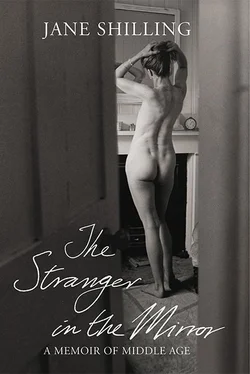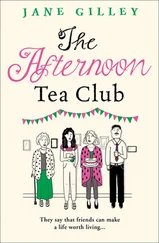I know this man doesn’t care for me. He is part of a series of overlapping sets, all clever, oblique, obscurely talented, incomprehensible: musicians, philosophers, classicists; tweed-jacketed Catholics with long, virginity-preserving beards sprouting from their milky, post-adolescent chops. A single girl is the object of their approval, privy to their complicated dry multilingual ironies and tweedy mathematical longings. She has long brown hair, grey-blue eyes, a matt skin of cream flushed with palest rose, a large bosom, shapeless clothing in modest shades of slate, mouse and taupe, a manner of enigmatic calm. She is, as even I, a non-Catholic, can see, a madonna.
It is clear to me that if I have a place at all in this very male realm of ideas and whisky, it is that of quite another biblical Mary. The mathematician has already pointed out – at length, with protracted pauses to accommodate his stammer, during which I wait patiently for the next staccato burst of disapproval – that my skirts are too short, my heels too high, my lipstick too bright, my ideas worthless, my looks negligible, my princessy airs risible. At this moment, I am only in his rooms because I consider myself in love with one of his improbable circle of friends, a noisy Irishman with a straw boater, a navy-and-white blazer striped like a pyjama jacket in the buttonhole of which he wears a pink carnation, and an immense collection of Grateful Dead albums.
Behind me in the room, Schwarzkopf’s soaring vocal line quarrels with the yelping view-halloos of the Irishman brandishing the whisky-filled teapot. The mathematician and I lean on the windowsill, saying nothing, and for an instant I feel that I have been absorbed by all this, that I have merged into, been obliterated by the ancient stone, the fading sunlight, the darkening sky, the song, the babble of words, the reek of spilt whisky, the moment itself.
The song ends, the setting sun plunges the quadrangle into grey shadow, the chatter in the room turns valedictory as people scatter to supper and essays, the moment of suspension vanishes, a bubble in the mind; a translucent sphere with this little scene – the window, the light, the stone, the song, the apprehension of love – trapped inside it and the troubling power to replay itself in my mind at random, inappropriate moments.
There are other bubbles, other scenes. (Why these? It disturbs me that I have no power over the workings of my memory; a memory, it seems to me, ought to function like a library. You fill in a slip indicating the volume you want to consult, put it in a wooden tray from which the mental librarian takes it away into the dim inaccessible recesses of the mental stacks, returning after an interval with whatever was required. The notion that I have a past consisting only of what chaotic, uncatalogued fragments of recollection my subconscious has thought fit to preserve, strikes me as an affront.)
In the park at Greenwich the switch trips again. It is an unseasonably hot day in April. The buds are just breaking on the horse chestnut trees, but the sun beats down hard and brazen as July. Scattered over the grass like patches of daisies are small encampments of mothers and children: within a protective wagon-circle of buggies, sunhatted babies occupy an annexed territory of rumpled rugs, advancing at a crawl across a landscape punctuated with tinkly balls, teddies worn threadbare by exigent loving and plastic pots of mashed banana. The mothers lie strewn on the warm grass, basking like beached seals.
Fifteen years ago my baby son used to tumble here in the shade of these cedar trees, beside these pungent plantings of French marigolds and begonia, mapping his new world, inch by inch, blade of grass by snail shell, in a slow unfolding of protracted astonishment, while I lay on the grass and observed him with the same watchful languor as I see now in these seal-mothers: marvelling at the intricacy of him, the nacreous, cushiony limbs, the round white-pink knees tender as field mushrooms, the intense concentration as he moved from pine cone to worm cast to dismantling a daisy (and all without a word of language in which to form his intentions or report his discoveries).
I am the mother of a teenager now: sinewy, ironical, his knees patinated with scars and grime, his brain a cabinet of curiously assorted facts: times tables, the Holocaust, the Gormenghast architecture of the Bluewater shopping centre, verbs that form the perfect tense with être , the season’s football fixtures, the periodic table of elements, the Dungeness lighthouse, major scales and their relative minors, the brass frogs around the fountain in St-Florent spewing jets of water from their metal throats. He is four inches taller than me. Under his bed are magazines in which girls with football breasts compete for space with news of Premiership transfers. A week ago he was mugged for his phone and his travel card under the budding chestnut trees in this park, by two boys who said they’d kill him if he grassed on them. The balance between us is shifting subtly: my arc of energy and authority just past its apex, curving imperceptibly towards a descent while his crosses it, rising.
Ten years ago – even five – I used to feel a longing, urgent as desire, to be free of the clinging drag anchor of a child; to reclaim the scornful, swift persona of my real self, my unencumbered, undivided pre-baby self. But as I stride past the large and small bodies on the grass in their milky collusion, their muddle of teddies and squashed banana, sharp as a stab of anguish in a phantom limb I sense the absent heft of a baby on my hip, the rebalancing, precise as sculpture, of the large skeleton with the small which I’ll never feel again, or not the same, recapture it as I fleetingly may with borrowed babies or future grandchildren.
What else is gone, I wonder, or going, in this counter-adolescence, this shedding of most of the things that have made me myself for the past thirty years? If the momentary hauntings are a reliable guide, the list includes not just babies and the sudden apprehension of love, but a certain gaiety; a mocking confidence. I have a flashback of myself buying big bunches of lilac in the street market on the boulevard Richard-Lenoir in Paris and thinking myself queen of the world as I carried them home. It is a long time since I have felt like the queen of the world. For a decade and a half I’ve been too busy for that sort of reverie, and now the moment for it is long past.
Il a foutu le camp, le temps du lilas , sang the French chanteuse, Barbara. Lilac time has buggered off. Which is pretty much the conclusion that I have reached, but leaves unanswered the question of what might replace it. My father’s mother was twice my present age when she died. If I have inherited her longevity along with her small hands and feet and her raptor’s profile, it means that I shall emerge from this second metamorphosis on which I am just embarking, rough-hewn into the essential lineaments of the shape in which I may survive for a further half-century or so.
I wish now that I’d asked her more, when she was alive, about what the second half of life was like. Quite early on she took to exaggerating her age: ‘Now I’m nearly 80,’ she began to say once she passed her sixty-fifth birthday. ‘Now I’m almost 90…’ Beyond noticing that unexpected inversion of the small vanity of lying about one’s age, I have only the sketchiest idea of what the other side of youth may be like. The messages that filter through from the other side of the frontier seem vague and fragmentary, inconclusive as badly tuned radio transmissions.
I wonder if this is less a reflection of the fact that the state of middle age and what follows is less beautiful, potent and fascinating – and thus less well reported – than youth, and more an accurate representation of the condition of growing older: that life itself grows vague, fragmentary and inconclusive. I try to imagine spending the next fifty years haunted by obscure trepidation as to the ravages of the future and poignant flashbacks to a past in which (I begin to feel) I squandered the luck and promise of the first forty years in most reckless fashion. It is not an alluring prospect. I hope alternatives will present themselves as time goes on.
Читать дальше












